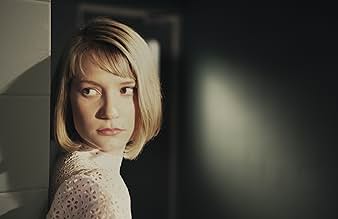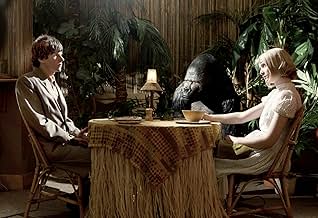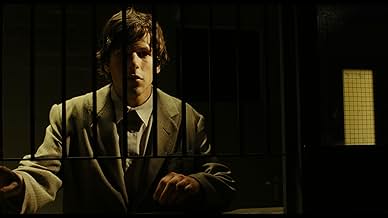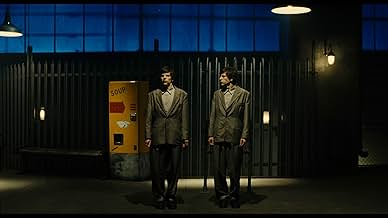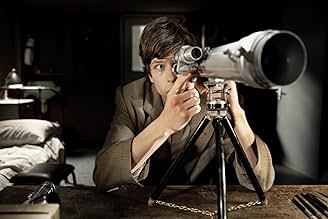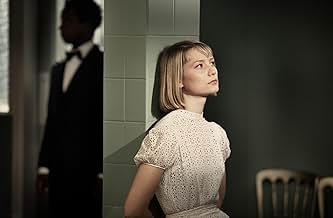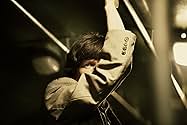Um funcionário de uma agência governamental descobre que sua vida toma um rumo terrível com a chegada de um novo colega de trabalho que é tanto seu duplo físico exato quanto seu oposto: conf... Ler tudoUm funcionário de uma agência governamental descobre que sua vida toma um rumo terrível com a chegada de um novo colega de trabalho que é tanto seu duplo físico exato quanto seu oposto: confiante, carismático e sedutor com as mulheres.Um funcionário de uma agência governamental descobre que sua vida toma um rumo terrível com a chegada de um novo colega de trabalho que é tanto seu duplo físico exato quanto seu oposto: confiante, carismático e sedutor com as mulheres.
- Direção
- Roteiristas
- Artistas
- Prêmios
- 1 vitória e 11 indicações no total
Avaliações em destaque
The story is about as bizarre as any I've seen lately. Simon (Eisenberg) is a very emotionally constricted and lonely young man. No one seems to notice him or care about him as he plods away at his job making no particular mark. In fact, he's literally a real 'nothing' as soon his work identification badge stops working and he is repeatedly hassled by the strange security guard who acts like he's never seen Simon before—though he's worked at the company for years. Then, out of the blue, a new employee comes to work—and he is the exact double for Simon. James (also Eisenberg) looks like Simon but no one seems to think this is unusual. What is really strange is that everyone seems to naturally love James and he's much the opposite of his lookalike. He's confident, aggressive and Simon eventually learns that he's also a bit of a user. While they are friends at first and James seems to be trying to help Simon, soon you see that James is trying to take over Simon's life and lonely Simon is becoming more and more alienated and depressed. What is poor Simon to do?
In many ways, this story looks like it was infused with liberal doses of the movies 1984 as well as Brazil. While the film lacks the huge budget of Brazil, the dystopian look to this place gives it an otherworldly feel that seems oppressive, strange and gloomy. It also has an odd sense of humor—though it certainly is not a comedy. This actually works well with the story. But what is it all about? THAT is the thing about The Double—no one is exactly sure what it all means. Since the story was written long ago folks have been debating this. Is this simply Simon's descent into madness? Are there literally two of him, a yin and a yang? Or, is there some other meaning? Some will like the film's vagueness—others will hate that they aren't being spoon-fed the answers. The bottom line is that the story is difficult, strange and confusing— and these are NOT qualities you find in a Hollywood picture. As for me, I liked it and appreciated that the filmmakers didn't try to make a film like any other. And, the strangeness certainly wasn't a bad thing. Would I like more films like this? Perhaps I might—but not in large quantities. But, as a change of pace, I really enjoyed the film. Whether or not you'll enjoy this strange film, I cannot say—it all depends on your tolerance for the surreal.
*I am confused. How can a film have four executive producers? Usually, there is one producer in charge (the executive producer) and the others are simply called producers.
I am not familiar with Dostoevskys book but this adaptation from Ayoade was really more like Kafka. A bizarre story set in a bureaucratic, soul-less environment where humanity tries to come out like a flower through concrete. Or as an obnoxious douchebag.
But the memorable Brazil-like imagery aside it's a few degrees too weird and loses you a bit.
First, this is a gifted film-maker, who doesn't want to play by the usual rules. Next, he knows how to get off to a great start, build a fascinating world, get you involved with his people, but third, he doesn't quite find ways to make his third acts pay off as interestingly (or powerfully or emotionally) as the first two-thirds of the film promise. In both films the focus drifts to less interesting elements or variations on the stories he's telling.
And last, he needs to lighten up on the too-obvious 'homage's to his cinematic touchstones. In "Submarine" it was (among others) Wes Anderson and "Rushmore". Here the overbearing influences (there are many) are led by Terry Gilliam's "Brazil". There were a large number of design and character choices – while effective - that came close enough that I couldn't help but sit there making comparisons ('Hey, there's Wallace Shawn doing Ian Holm'). And it starts to approach that fine line between inspiration and plagiarism.
That said, there's a lot to like here. The photography is often gorgeous. Jessie Eisenberg does a terrific job in a tough double role – a meek office worker who is suddenly faced with another employee who looks exactly like him. But the new guy has a brash, self-confident personality, everyone loves him, and no one else seems to notice the two are physically exactly alike, right down to their clothes.
This raises interesting questions about personality, perception and reality. Is "James Simon" (the cool one) merely a psychological projection of the nerd, "Simon James"? But if that's the case, why does everyone else interact with both, together and separately? Is it that Simon is the only one who thinks they look alike? i.e. is Simon projecting himself onto someone who – if we saw objectively – wouldn't even really look like him? Well, that would be an interesting idea, and a promising road for the film to explore, and it hints heavily at that possibility, only to simply drop and contradict it.
And that's part of why this is two-thirds of a great film, not a whole one. In the end things play out in a way that has been foreshadowed from early on, and suddenly the film feels less deep, less challenging, more an exercise in cinematic playfulness than an exploration of deeper themes both personal and societal. The head trip becomes too literal, the conclusions too simple for the complex surreal reality we've come to accept
On the plus side, the effects are terrific, and many of the best scenes in the film are Eisenberg talking to himself in one shot. (A hell of an acting challenge as well). And the film has a dark sense of humor that keeps the Kafkaesque world and 'big themes' from becoming ponderous, (Again, I just wish I had less often chuckled, but then thought 'hey, that just like the scene in 'Barton Fink ', or whatever).
In any case I look forward to whatever Ayoade does next, but I hope he will find a way to finish as strong as he starts, and to be brave enough to trust his own very good sense of style, and not borrow quite so much from others.
The lighting, the sounds, the camera shots are all wonderfully done, setting a disturbing and unsettling atmosphere that gently but with increasing urgency begins to throw a blanket of latent claustrophobia across characters and happenings. We witness curious incidents and are left to guess their significance, our hero reaches out to the girl but is beaten to the jump by....who exactly?
How much of what we see actually takes place is questionable. How much some of the latter scenes make sense even more so. Yet, as it twists and turns towards the denouement, I found myself gripped and engaged to an uncommon degree. It is a difficult movie as it winds up, no question, but I find the notion that anyone feeling suicidal needs warning before viewing as slightly hysterical.
On the one hand, this is an easy film to describe, whether you reference the source material, or your talk about the doppleganger and what it might be like to find one has a double. Yet on the other hand, it's almost impossible to sum this up after one viewing, as there felt like there are so many little bits and pieces that suddenly reveal themselves to your eyes and ears. that you're forced to think about going back to sit back through it again. The question is, which one of you will go...?
This is a dark, moody comedy peppered with some hilarious dialogue and genuine pathos although it doesn't quite fulfil its early expectations. The real highlight here is Ayoade's directorial style with real shades of Terry Gilliam in its surrealist approach to the world he has created. He cranks up the volume of everyday things like taps running or footsteps to build tension up in scenes and Jesse Einsberg is perfect casting for playing both roles.
A real curious piece but one which deserves an audience and suggests Ayoade is on track to become a real tour de force.
Você sabia?
- CuriosidadesThe piano motif throughout the film comes from the song 'Der Doppelgänger' by Franz Schubert; the words to this piece tell the tale of a man and his evil twin.
- Citações
Simon: I don't know how to be myself. It's like I'm permanently outside myself. Like, like you could push your hands straight through me if you wanted to. And I can see the type of man I want to be versus the type of man I actually am and I know that I'm doing it but I'm incapable of what needs to be done. I'm like Pinocchio, a wooden boy. Not a real boy. And it kills me.
- ConexõesFeatured in Film '72: Episode dated 5 March 2014 (2014)
- Trilhas sonorasAkasaka Rain
aka "Ameno Akasaka"
Written by Jun Hashimoto, Tsunaki Mihara
Published by Watanabe Music Publishing Co. Ltd (c) 1968
Administered by Fairwood Music (UK) Ltd for the UK & Eire
Performed by The Blue Comets
Licensed courtesy Watanabe Music Publishing Co. Ltd
Administered by Fairwood Music (UK) Ltd for the UK & Eire
Principais escolhas
- How long is The Double?Fornecido pela Alexa
Detalhes
Bilheteria
- Faturamento bruto nos EUA e Canadá
- US$ 200.406
- Fim de semana de estreia nos EUA e Canadá
- US$ 14.646
- 11 de mai. de 2014
- Faturamento bruto mundial
- US$ 1.662.515
- Tempo de duração
- 1 h 33 min(93 min)
- Cor
- Mixagem de som
- Proporção
- 1.85 : 1







